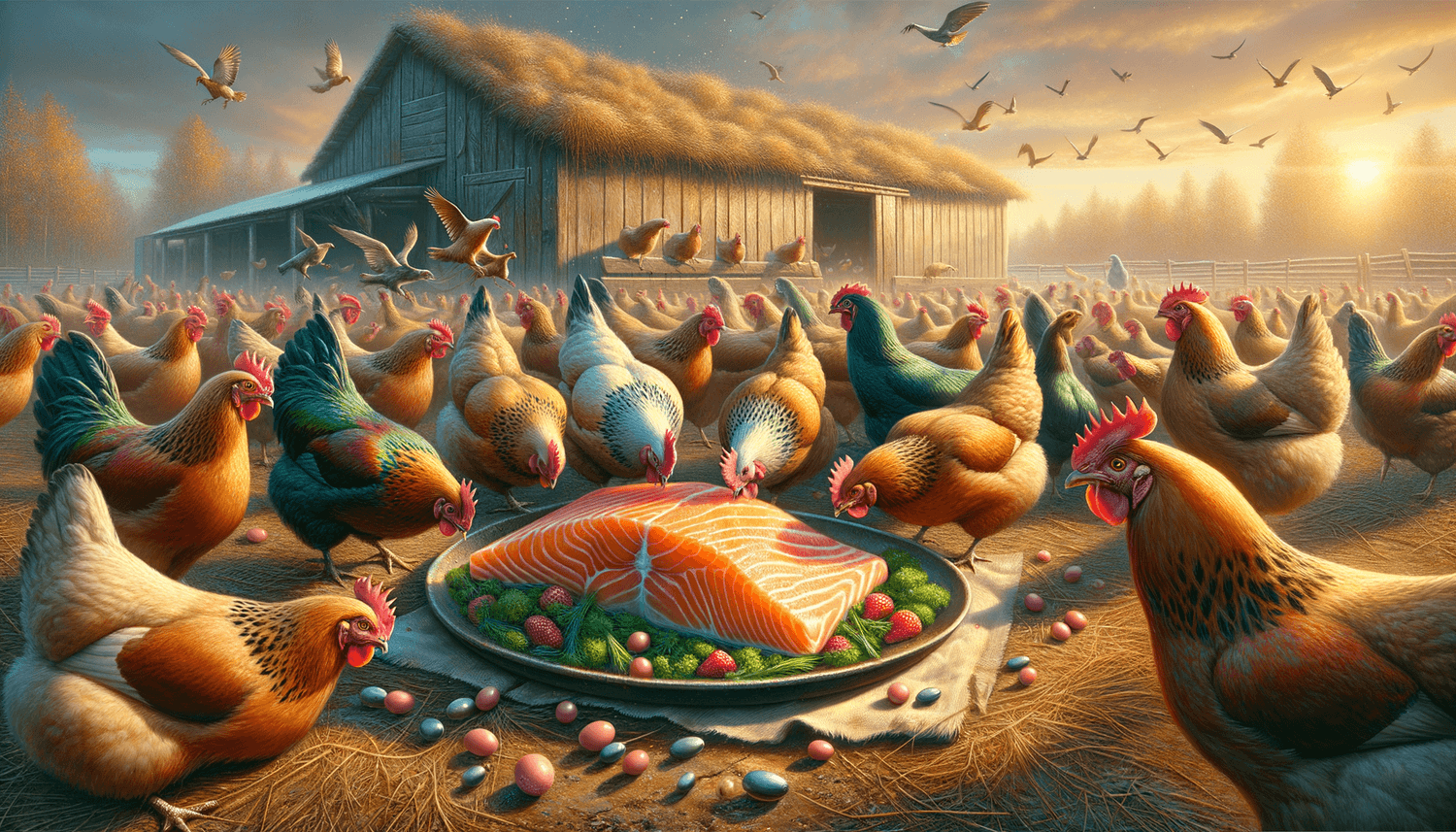Welcome to another egg-citing discussion about our beloved backyard chickens! This time, we’re swimming upstream to explore a Fishy Question: Can Chickens Eat Salmon? As you know, maintaining a balanced diet for our clucky friends is a top priority, and it’s important to know the limits of their wild culinary adventures. In this blog post, we’ll dive into the depths of this intriguing topic, reel in the benefits and risks, and navigate the current of nutritional value. So, without further ado, let’s slip on our waders and cast our nets into the wonderful world of chickens and salmon!
Can chickens eat salmon?
Yes, chickens can indeed eat salmon, and it is safe for them. Salmon, as a good source of protein, healthy fats, and vitamins, can be a nutritious addition to a chicken’s diet. However, it is important to ensure that the salmon is cooked, properly deboned, and provided in moderation to maintain a balanced diet for your feathered companions.
A balanced diet for happy hens
Chickens, much like humans, need a balanced diet to stay healthy and thrive. A well-rounded chicken diet is crucial to ensure they remain active, lay nutritious eggs, and live a happy life. The importance of striking the right balance between different food groups cannot be stressed enough for our feathered friends.
A chicken’s diet should primarily consist of high-quality chicken feed, making up around 80-90% of their daily intake. This chicken feed contains the essential nutrients, vitamins, and minerals necessary for their overall well-being. The remaining 10-20% of a chicken’s diet allows room to offer tasty treats such as fruits and vegetables, providing both variety and additional nutrients.
Nutritional value of salmon for chickens.
Feeding salmon to chickens can indeed have significant nutritional benefits, as salmon is a good source of protein, healthy fats, and essential vitamins and minerals. Protein is a key component of a chicken’s diet, required for maintaining a strong and healthy body, repairing body tissues, and helping with the production of strong and well-formed eggshells. Salmon, being a rich source of high-quality protein, can contribute to fulfilling these dietary requirements.
Additionally, salmon boasts a high content of omega-3 fatty acids, which are beneficial for brain health, improved immune function, and heart health. While chickens do not necessarily need as much omega-3 as humans, it’s valuable to note that chickens that consume higher levels of these healthy fats lay eggs with a higher concentration of omega-3, making it beneficial for both the chickens and the people consuming their eggs.
Not to forget, salmon is also a great source of vitamins and minerals such as vitamin D, vitamin B12, and selenium. Vitamin D is responsible for calcium absorption and bone health, while vitamin B12 aids in maintaining a healthy nervous system, and selenium serves as an important antioxidant. These nutrients can contribute to the overall wellbeing of your backyard flock when salmon is incorporated into their diet in moderation.
Nutrition table of salmon for chickens.
| Information | Description |
|---|---|
| Nutritional Value | Salmon is a rich source of protein, omega-3 fatty acids, vitamin D, vitamin B12, and selenium. |
| Suggested Serving Size | A small, deboned and cooked piece of salmon, periodically included as a treat. |
| Safe Feeding Practices | Offer salmon in moderation, as too much can lead to an imbalanced diet, and make sure it is properly deboned and cooked. |
| Preparation | Remove all bones and cook the salmon thoroughly before feeding it to chickens. |
| Potential Risks | Feeding raw or undercooked salmon can expose chickens to bacteria and parasites; overfeeding may result in imbalanced nutrition. |
| Hydration | While salmon doesn’t provide a significant amount of hydration, always ensure your chickens have access to clean water. |
| Digestion | Protein in salmon can be easily digested by chickens, but excessive consumption may tax their kidneys. |
| Seasonal Availability | Salmon is typically available throughout the year, although prices and quality may vary seasonally. |
| Other Benefits | Chickens that consume salmon lay eggs with higher levels of omega-3 fatty acids, making those eggs healthier for human consumption. |
Alternatives to salmon for your flock
While salmon is a nutritious treat for your chickens, there are many other options to choose from when looking to diversify their diet. If you’re concerned about cost, availability, or anything else related to feeding salmon, consider offering alternative protein sources, such as mealworms, cooked scrambled eggs, or cottage cheese. These can be more affordable and often more readily available. In addition to providing the needed protein, they also contain essential amino acids that benefit your chickens’ health.
The importance of grit
When treating your chickens with salmon, fruits, vegetables, or any other food apart from their regular chicken feed, it’s essential to provide grit alongside. Grit is composed of small, insoluble particles that aid in digestion by helping to grind up solid foods in the chicken’s gizzard. This helps chickens effectively and safely break down the extra treats you give them, ensuring proper absorption of the nutrients. You can easily find grit sold in most pet stores and online platforms specializing in poultry products.
Conclusion
In conclusion, feeding your backyard chickens salmon can be a valuable addition to their diet when offered in moderation and prepared correctly. The protein, healthy fats, vitamins, and minerals found in salmon contribute to their overall health and the nutritional quality of their eggs. However, keep in mind that their primary diet should consist of high-quality chicken feed. By maintaining a balanced diet and monitoring their overall health, you’ll keep your flock happy and thriving while producing delicious, nutritious eggs.

















